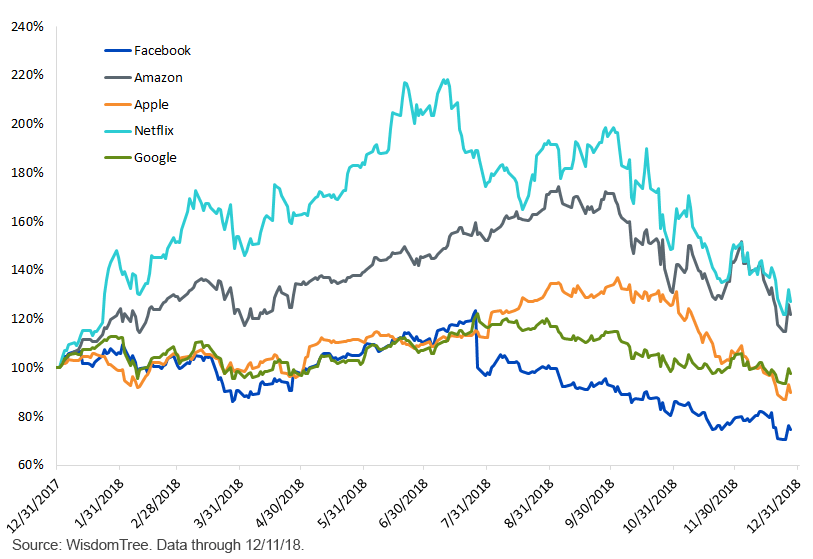Cheering for Daniel-san to Crane Kick the FAANGs


FAANG. What an acronym. A FAANG stock, cobra logo on its uniform, is like the antagonist in the classic 1984 movie The Karate Kid.
The FAANG (Facebook, Apple, Amazon, Netflix and Google-parent Alphabet) is unstoppable as he sweeps the leg and kicks the proverbial “value stock,” Daniel-san, in his broken ribs. No mercy. Miyagi, Daniel-san’s mentor, cannot help him.
At least that was the situation until a few months ago, when both Apple and Amazon reached valuations north of $1 trillion.
When I wrote about the top-heaviness of FAANG stocks in market capitalization-weighted indexes in 2018, these five stocks alone accounted for about one-eighth of the U.S. stock market. Since then they have been cracked, with Facebook and Apple taking the hardest hits.
Figure 1: Share Price Performance, 2018

Not many of us have issues with Netflix as an organization. But the other four FAANGs’ public reputations are on tenterhooks.
Amazon gives millions of small businesses sleepless nights, while its employees complain of poor working conditions. Want to talk about business risk? Wake up one morning to President Trump doing a Teddy Roosevelt trust-buster impersonation. You’re unstoppable until Daniel-san gets into the crane position.
Or look at the half-dozen reasons that reasonable people hate Facebook. One of them is probably our collective inability to prevent hundreds of images of our children from being plastered on its site, even if we are not “on Facebook.” If you don’t like it, tough luck. The BBC cites an Ofcom study finding that 70% of people do not think it is OK to share images of others without permission. It’s that other 30% that the rest of us have to worry about.
But there’s so much more.
Facebook is beset by accusations about "fake news" and political biases. Also, how about your high schooler’s shrinking attention span and growing self-doubt as friends post solely their life’s highlights? Stock market sentiment is a fragile thing: $379 billion is a lot to pay for a company that you and your next-door neighbor dislike.
And while we’re talking about aiding and abetting our society’s mass experiment with device-addicted zombie scatterbrains, there’s Apple. It sells the pipe to the smoker.
There is no shortage of people itching for Daniel-san to kick some of these companies in the face, in the interest of civil society. Our industry wants to talk about environmental, social and governance (ESG) screens. Great. Let’s talk candidates.
Google cannot be forgotten. The internet was supposed to be a utopia of free discourse. Free discourse, unless the Chinese Communist Party’s censors give you heat.
When a company like Sears or Woolworth’s rolls over, most of us feel bad, nostalgic even. But there is something unsettling when the top of the S&P 500 is populated by companies that are dinner table pariahs.
If Daniel-san is doing that awesome crane pose and kicking some of these FAANGs across the face, there are value-investing “Miyagis” out there watching from the sidelines, giving a slow nod of approval.


